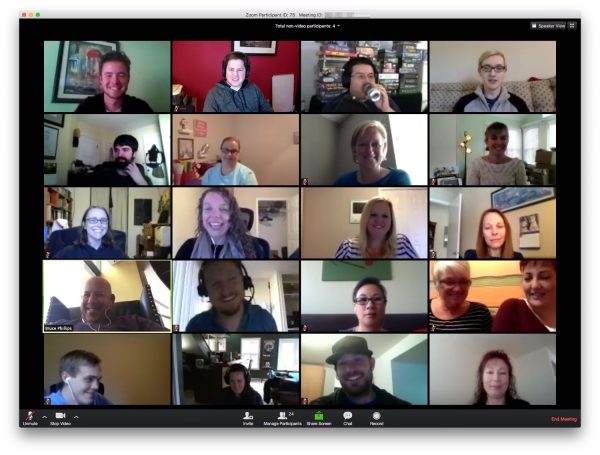 by Kathryn Cambrea
by Kathryn Cambrea
My 4th semester of college just ended a few weeks ago, but it doesn’t feel like that way. Last May, I remember sitting by the pool tables of St. Thomas Aquinas College, laughing yet on the verge of sobbing at the prospect of not seeing my friends every day due to the semester’s end. Little did I know that a year later, I would truly learn what it’s like to be separated for an extended period of time.
As upset as I was before summer break of 2019, the sadness was temporary. I celebrated the end of finals by seeing Cher perform at Prudential Center. I made sure to catch up with friends for dinner and coffee. I worked and swam at a local pool. I even embarked on a memorable family vacation.
And now? Life just… halted.
COVID-19 is an enemy we scarcely know how to fight. As much as I would love for normal life to continue, I recognize that it is a selfish desire: people are still dying at a drastic rate. What’s next is anyone’s guess.
One lesson that I have learned from quarantine is the significance of routine and structure in life. Everyone’s live have been disrupted, but no one more than those who truly depend on routine. My brother has oral motor apraxia (a speech disorder which makes him nonverbal). Despite being nonverbal, he thrives on social interaction and structure. On a typical school day pre-quarantine, he hops on the school bus to attend his special needs school. This school is great for him since he not only gets to spend time with his friends and his teacher, but receives services like physical therapy, occupational therapy, and speech therapy. Also, he gets hands-on experience learning skills that he can use later in the workforce and even embarks on class trips to apply day-to-day skills, such as selecting food at stores and paying for it.
Quarantine has taught me that structure not only applies to everyone, but is incredibly essential to the special needs community. My brother is blessed to have a teacher and staff members who continue to provide education and services virtually through Zoom or recorded sessions. But instruction and services which have recently been provided remotely do not equate in any way to the efficacy and necessity of those provided at school. My brother must be confused; he sees his friends on the screen each day, but it is not yet summer. Nor is it a break of any kind. So, why isn’t he at school?
Nonetheless, my brother is a trooper and beams when he sees his friends, teacher, and speech therapist on screen. Just recently, his class celebrated his birthday at the end of their Zoom session. Like him, I too celebrated my birthday during quarantine. On my birthday I reflected on the necessity of holding onto hope.
A professor of mine assigned an optional video project. The purpose was to think of this time relative to the future by composing those thoughts in a letter. I filmed a video of myself reading my letter–from my my current self to myself a decade from now. I filmed my video on my birthday to be watched by an older me on her 30th birthday. This project made me optimistic about what I will accomplish within the next 10 years.
This time has also taught me that we should be grateful. My brother and I have a mother who loves us and did the best she could to make both of our birthdays memorable.
Most of all, this time has taught me that love is paramount. Right now, my family is interdependent. Although I excelled academically, I was emotionally overwhelmed with the workload and change in routine. My mother served as a caretaker of my brother and myself, as well as a listener in my moments of distress. In the beginning, my mother was apprehensive to navigate virtual platforms such as Zoom, so I taught her how to use them. Of course, my brother relies on the assistance of my mother or myself during his Zoom sessions to maintain his focus. We all need each other, so we help each other.
I admit that being cooped up in a house with the same 2 people for almost 100 days with nowhere to go besides the neighborhood for brief walks and bike rides can be exasperating. So, talk to your friends on the phone. Venture outdoors solo if you can. Read a book. Just know when you finish your short escape or story, the rest of the family is still there when you return. So go back into your home or rise up from where you were reading. If you were just outside, be sure to wash your hands. Hug the people around you because you are grateful that they are alive. And remember that these people, these are the people you love.
Kathryn Cambrea is a student at St. Thomas Aquinas College.








